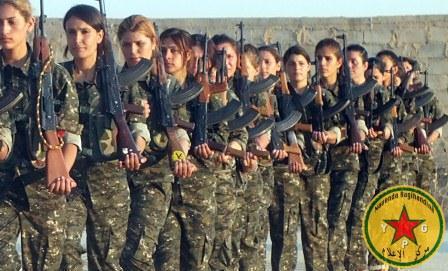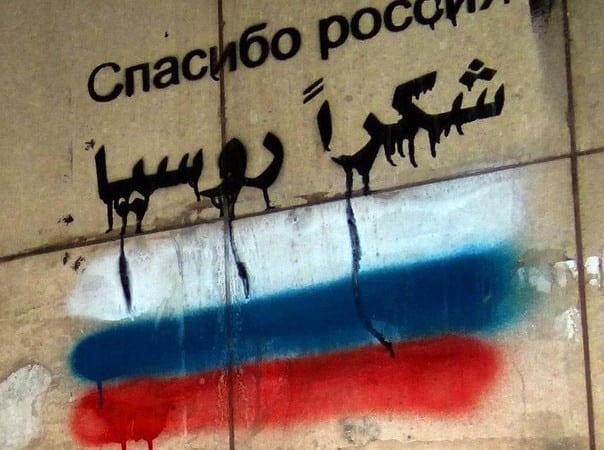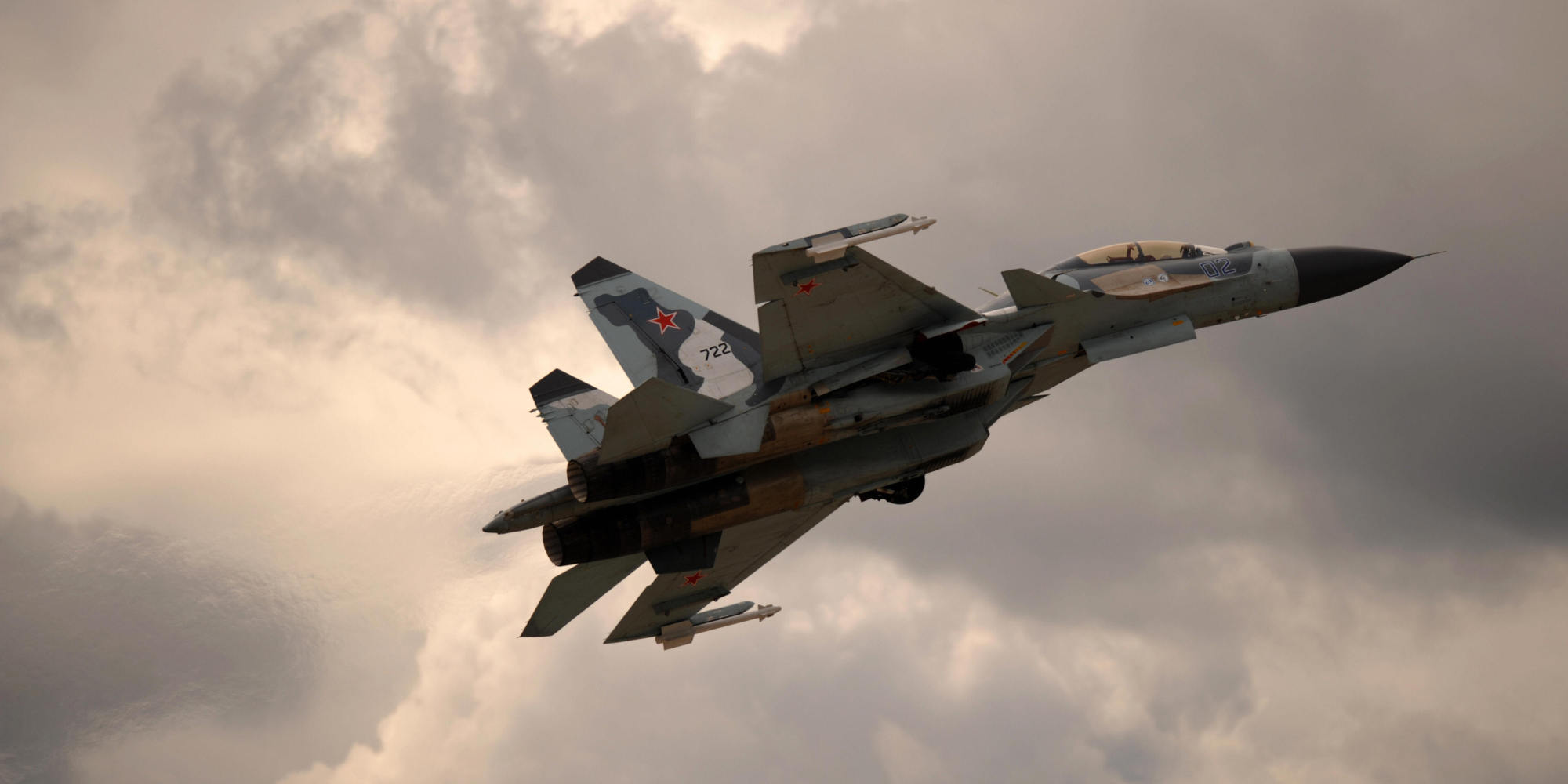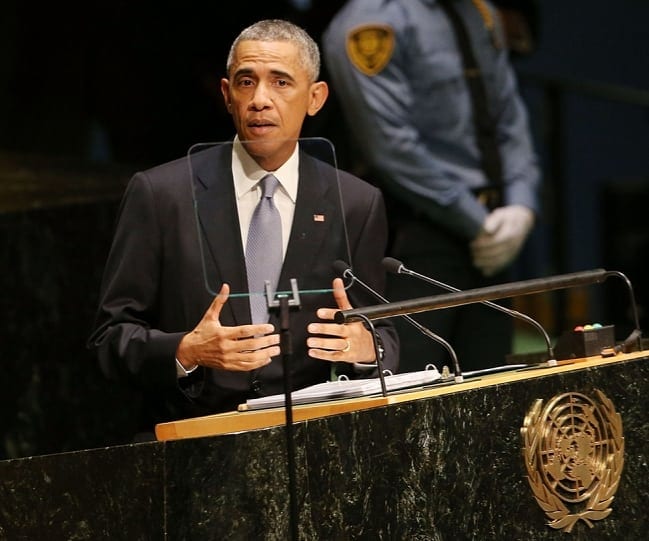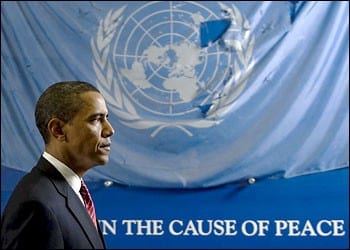The Eagle, the Bear and the Dragon – a short fable for our times of trouble
RADIO WNYC Stephen Cohen about Fake News, Neo-McCarthyism, Aleppo, CIA hacking allegations and Rex Tillerson
ABOVE IMAGE: STEPHEN COHEN HAS BEEN PATIENTLY BATTLING TO INJECT SOME TRUTH AND SANITY IN A NATIONAL DEBATE CONTROLLED BY NEOLIBERAL DISINFORMERS.
Note to Commenters
Due to severe hacking attacks in the recent past that brought our site down for up to 11 days with considerable loss of circulation, we exercise extreme caution in the comments we publish, as the comment box has been one of the main arteries to inject malicious code. Because of that comments may not appear immediately, but rest assured that if you are a legitimate commenter your opinion will be published within 24 hours. If your comment fails to appear, and you wish to reach us directly, send us a mail at: editor@greanvillepost.com
We apologize for this inconvenience.
=SUBSCRIBE TODAY! NOTHING TO LOSE, EVERYTHING TO GAIN.=
free • safe • invaluable
Why’s The US Hanging Turkey Out To Dry?
![]()
//
=By= Andrew KORYBKO (USA)

Women play a prominent role in the Kurdish military mobilization. The Kurds have been fighting for their independence for generations, and subjected to numerous betrayals and acts of horrific aggression by the nations they happen to live in.
Turkey’s shooting down of the Russian anti-ISIL aircraft was an unprecedentedly direct aggression against Moscow that trumps even the tense and hostile militarism of the Old Cold War era. The world stands on edge in the immediate aftermath of this attack, with tabloid-esque commentators warning that the beginning of World War III awaits. President Putin, for his part, has been much more measured in responding to the incident, but still couldn’t contain his shock at having received this “stab in the back delivered by accomplices of the terrorists.”
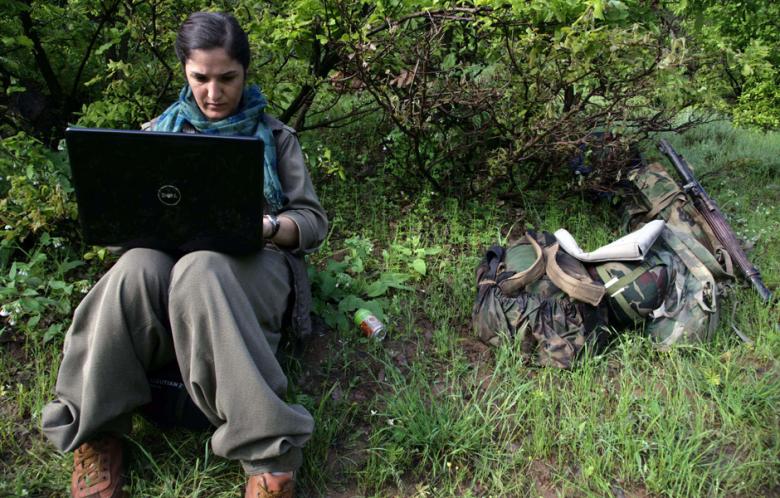
A female Kurdistan Workers’ Party (PKK) fighter works on her laptop after arriving in the northern Iraqi city of Dohuk on 14 May 2013, after leaving Turkey as part of a peace drive with Ankara. The Kurds are recognized as among the bravest and best fighters in the region.
The question now comes down to how Russia will respond to what happened, but perhaps even more important for observers to ponder is why the US is unofficially distancing itself from its ally’s aggression. Despite both NATO and Obama giving full backing to Turkey’s fateful decision, Reuters has quoted an anonymous American military official that purposely leaked that the Russian plane was downed while over Syrian airspace, basing the assessment on heat signature detection. This raises questions about why the US is playing both sides of the fence – on one hand, publicly supporting Turkey, while on the other, strategically releasing information that conflicts with Turkey’s official depiction of events.
The Setup:
[dropcap]T[/dropcap]his dichotomy is suggestive of a Machiavellian plan whereby the US manipulates both Turkey and Russia into behaving according to what it has already forecast as their most likely responses, knowing full well that these could be guided into supporting grander American strategic interests. For starters, the US likely intimated to Erdogan that not only does he have the ‘legal’ right to shoot down any Russian aircraft he chooses, but that the US would actually prefer for him to take this course of action sooner than later. This is reminiscently similar to how the US put Sakkashvili up to bombing Tskhinval and invading South Ossetia – it may not have directly issued an official, on-paper order for this to occur, but it left no ambiguity as to how it wanted its proxy to act in each situation.
According To Plan:
For the most part, this explains the public pronouncements of NATO and the US’ support for Turkey’s actions, and it also goes a long way in soothing Erdogan’s nerves and reassuring him that he did the right thing. The predicted aftereffect of the plane’s downing was an immediate deterioration of Russian-Turkish relations, with the full consequences potentially affecting the diplomatic, military, economic, and energy spheres. Foreign Minister Sergei Lavrov cancelled his upcoming trip to Turkey and advised Russian tourists to refrain from visiting the country due to the terrorism level being similar to Egypt’s. Prime Minister Dmitry Medvedev has spoken about the possibility of barring Turkish companies from the Russian market and cancelling planned nuclear and gas projects with the country.
 All of these prospective actions are fully justifiable and grounded in the self-respect that Russia feels in not aiding what has proven itself to be a militantly hostile state no matter the economic stakes involved, but at the same time, one can’t help but wonder whether this is exactly what the US wanted. There’s no doubt that Russia would react this way, as even a cursory glance of its potential ‘response toolkit’ indicates that these are the most likely to be taken amidst any deterioration of relations. Therefore, it can’t be discounted that the US put Erdogan up to shooting down the Russian jet precisely to provoke the predictable Russian response in threatening to cancel its forthcoming energy projects with Turkey, the core of the strategic partnership between the two. If this is the case, and it certainly seems likely, then it shows exactly how far the US is willing to go to make sure that Russian energy (and subsequently, all of the soft power and multipolar advantages that come with it) doesn’t enter the Balkans through the Turkish Stream megaproject, likely because it understands the transformative impact that this would eventually have on the entire region.
All of these prospective actions are fully justifiable and grounded in the self-respect that Russia feels in not aiding what has proven itself to be a militantly hostile state no matter the economic stakes involved, but at the same time, one can’t help but wonder whether this is exactly what the US wanted. There’s no doubt that Russia would react this way, as even a cursory glance of its potential ‘response toolkit’ indicates that these are the most likely to be taken amidst any deterioration of relations. Therefore, it can’t be discounted that the US put Erdogan up to shooting down the Russian jet precisely to provoke the predictable Russian response in threatening to cancel its forthcoming energy projects with Turkey, the core of the strategic partnership between the two. If this is the case, and it certainly seems likely, then it shows exactly how far the US is willing to go to make sure that Russian energy (and subsequently, all of the soft power and multipolar advantages that come with it) doesn’t enter the Balkans through the Turkish Stream megaproject, likely because it understands the transformative impact that this would eventually have on the entire region.
The Curveball:
[dropcap]T[/dropcap]hus far, everything seems reasonable and well within the realm of predictability, but the curveball comes with the Reuters revelation that an unnamed American military source is essentially saying that the Russian position is justified. Unexpectedly, it now seems as though the US is also playing to Russia’s side to an extent, and this raises questions about what it really wants. After all, it’s been proven beyond any doubt that American-supplied TOW anti-tank missiles were used to down the Russian rescue helicopter that attempted to retrieve the two pilots. With this indisputable evidence of indirect American aggression against Russia, it certainly is a curious fact that the US establishment would purposely leak a statement saying that Turkey downed the Russian plane in Syrian airspace, and basically take Russia’s side on this behind the scenes.
Playing The Kurdish Card:
Explaining this diplomatic twist requires knowledge about the popular response that Russian citizens and global supporters worldwide are requesting to Turkey’s aggression. They quite reasonably propose that Russia intensify its arms shipments to anti-ISIL Kurdish fighters, with the wink-and-a-nod approval that some of them would be siphoned off to the PKK and be used against the Turkish military. This is an effective and pragmatic plan, and in reality, it actually doesn’t even require a policy shift from Moscow because support is already being rendered to some Kurdish groups as part of their joint cooperation in the anti-ISIL struggle. The Kurdish Insurgency hasn’t gone away since Erdogan unwittingly unearthed it this summer as an electioneering tool, and the fact that it’s still going strong even after the elections has scared him so much that he might have been the one who ordered the recent assassination attempt against pro-Kurdish HDP co-chairman Selahattin Demirtas. Thus, if Russia chooses to inflict an asymmetrical response to Turkey by beefing up its indirect support for the PKK and other Turkish-based anti-government Kurds or disrupting Blue Stream gas supplies in order to provoke an intensified rebellion, then it could certainly inflict a heavy amount of strategic damage to Erdogan and increase the likelihood either of a military coup in Turkey (explained more in detail as part of a different article accessible here) and/or the creation of an independent Kurdistan.
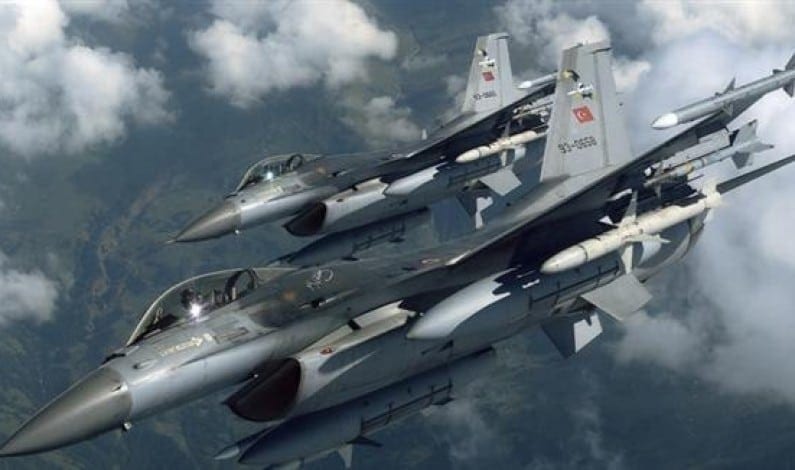
Much of Turkey’s air force equipment has been supplied by the US and the rest of the NATO bloc. The planes have been mostly used to attack Kurdish fighters engaged in combatting ISIL.
That being said, the US has traditionally been the out-of-regional power that has the greatest interest in Kurdistan, seeing the possible state as a ‘geopolitical Israel’ from which it can simultaneously exert influence on the rump portions of Turkey, Iran, Iraq, and Syria. The strategic trajectory of a theorized Kurdish state has been complicated by the anti-ISIL campaign, however, since many Kurds have shown themselves to be pragmatic in cooperating with Russia and Iran against this shared threat. The positive multipolar cooperation that each of these countries has engaged in with the Kurds challenges the US’ planned hegemony over them and their territory, and it thus means that any forthcoming independent Kurdish political entity could theoretically go either towards the multipolar or the unipolar camps. At this point in time, and given all of the dynamic military and diplomatic developments of the past couple of months, the loyalty of a future Kurdish state (no matter if its boundaries are confined only to present-day Turkey and/or Iraq) is totally up for grabs, and it’s impossible to accurately forecast which way it will go.
…
[dropcap]T[/dropcap]he strategic ambiguity that this entails means a few things to the US and Russia. For the US, it indicates that the time is now for it to bunker down and support Kurdistan’s independence before it loses the strategic initiative to Russia, which might be moving in this direction (whether formally or informally) out of grand geopolitical spite for Turkey. Moscow, as was just mentioned, seems inclined to hit Ankara where it hurts most, and that’s through supporting the Kurdish Insurgency in one way or another. However, it’s not yet known how far this would go, and whether Russia would pursue this strategy as a form of short-term vengeance or if it would resolutely go as far in recognizing Kurdish Independence if it could ever be de-facto actualized. Of course, Russia wouldn’t do anything that could endanger the territorial integrity of its Syrian, Iraqi, and Iranian allies, but if the Turkish-based Kurds contained their ambitions solely within the borders of Russia’s historical rival, then it might be able to rectify itself with this reality, especially if they even refrain from legal independence and instead seek a sort of broadly de-facto independent federative or autonomous status within a unified Turkey (which could only realistically be brought about by an intensified insurgency and/or a coup in Ankara).
Joining Hands For Kurdistan:
Having explained all of this, it’s now clear that a remarkable convergence of strategic interests has developed between the US and Russia focusing on Turkish-administered Kurdistan. Understanding the changing calculations that Russia may now be having towards this topic as a response to Turkey’s aggression against it, one can’t necessarily preclude the possibility that the Reuters leak was actually a strategic overture to Russia. Washington might be sending a signal that it wants to speak to Moscow about ways to cooperate in this regard, knowing that each of them possibly have an interest now in seeing the proto-state rise to the fore of the global arena. A shared understanding has likely developed by now that a New Cold War competition for Kurdistan’s loyalty could be fought after the entity is legally formalized (whether as an independent state or a de-facto independent sub-state entity modeled off of the Kurdish Regional Government in Iraq), and that the two Great Powers need to put aside some of their differences in joining hands to see this happen first.
Such a strong signal could have been discretely and secretly communicated to Russia via secure diplomatic and intelligence channels, but the reason it was so publicly broadcast via Reuters, the global newswire service, is because the US also wants to send a signal to Turkey as well. Despite taking its side on the matter before the global eye, the US is also “stabbing its ally in the back”, to channel President Putin, by purposely leaking the information that the Russian jet was shot down over Syrian airspace. It’s not news that the US has been unhappy with Erdogan for not behaving more submissively in the past and refusing to blindly go along with the previous plans to invade Syria (rendered useless after Russia’s anti-terrorist military intervention there), so it might be trying to convey the message it’s had enough of his games and is now playing their own in return. Of course, the US has always been manipulating Turkey ever since it joined NATO and allowed the Americans to operate out of Incirlik airbase, but this time, the treachery is being taken to a higher level by implicitly throwing out suggestions to Russia, Turkey’s new foe (and only because the US manipulated Turkey into taking aggressive action against it), that it might want to team up in undermining Ankara’s control over its volatile southeast.
Concluding Thoughts:
[dropcap]I[/dropcap]t can safely be assumed that the US influenced Turkey into shooting down the Russian jet over Syrian airspace, predicting quite accurately that this would immediately lead to the deterioration of ties between the two states. An elementary forecast of the specific counter-measures that Russia may take stipulates that these will likely relate to the diplomatic, economic, and energy sectors, which is just what the US wants. Because of Turkey’s aggression against Russia, the strategic partnership between the two is now broken (although not necessarily irreversibly), and Ankara has become the fourth and perhaps most geopolitically significant member of the anti-Russian Intermarum coalition. Furthermore, Turkish Stream looks to be indefinitely put on hold, thus delaying Russia’s game-changing pivot to the Balkans. While the ‘unintended’ consequence of the crisis has been Russia’s foreseeable and absolutely legitimate decision to deploy the S-400 SAM system to Syria, this in a way also plays to the manipulated Turkish-Russian rivalry that the US wanted to produce in order to solidify the completion of the Intermarum project and simultaneously counter Russia’s growing influence in the Mideast.
The reaction that no one could have predicted, however, is the US purposely leaking comments to Reuters that support the Russian version of events, namely, that the anti-terrorist jet was shot down while flying over Syrian airspace. This completely conflicts with what the US and NATO have said in public, but it shows that the US has had enough time to game out the plane-shooting scenario well in advance, and that it’s playing a sinister divide-and-conquer game against Turkey and Russia. Put in the position where its decision makers are scrambling for responses to the unprecedented aggression against them, Russia can now more easily be led into supporting the Kurdish struggle for sovereignty (whether formally independent or de-facto so) in Turkey, which coincides with one of the US’ premier geopolitical projects.
From an American perspective, a divided Turkey is doubly useful for its grand strategic designs, as the large pro-NATO Turkish military would remain mostly intact, while the US could gain a major base for force projection (both hard and soft) right in between some of the most important states in the region. It can’t, however, go fully forward with this project unless it has the support of the diplomatic leader of the multipolar world, Russia, otherwise Kurdistan will be just as illegitimate as Kosovo is and might not even come to geopolitical fruition if Moscow and Tehran work to stop it.
Seen from the Russian standpoint, the US’ intimations actually seem quite attractive. An increase of Russian support to anti-ISIL Kurdish fighters would be a plausibly deniable but strategically obvious way to funnel weapons and equipment to anti-Turkish PKK insurgents. Weakening Turkey from within would be a strong asymmetrical response to a country that has lately been a major thorn in Moscow’s side, and it might create the conditions either for a military coup against Erdogan, a divide between him and Davutoglu (which could be used to Russia’s diplomatic advantage so long as the constitution remains unchanged and Davutoglu legally remains more powerful than Erdogan), or a weakening of Erdogan and a tempering of his anti-Russian and anti-Syrian positions.
Importantly, the emergence of an independent or semi-independent Kurdish entity in Turkey could create a tempting piece of geopolitical real estate in the New Cold War, but of course, it would then be contested between the multipolar and unipolar worlds. Still, however, it would represent a positive multipolar development in the Mideast, since under the present state of affairs, the entirety of Turkish territory is under unipolar control. If a large chunk of it suddenly became the object of competition between both blocs, then it would definitely signify a strategic advancement at the expense of unipolarity. Of equal importance, this would also significantly impact on the Turkish state and whatever government is in power by that time, and it could possibly make it more amenable to returning to the previously pragmatic relationship with Russia and perhaps even resurrecting Turkish Stream.
Therefore, Russia surprisingly has nothing to lose and everything to gain by covertly supporting the Kurdish cause in Turkey, no matter if it’s full-out independence or relatively more restrained autonomy, and even if this objective is shared by the US and done in semi-coordination with it. Turkey would immediately be put on the defensive (although it could try desperately responding by supporting Tatar terrorists in Crimea), the multipolar world have a chance at competing for the loyalty of an ultra-strategically positioned entity, and the consequences that this has for the Turkish government (whether it remains the same or is changed via a [military] coup) could recreate the political conditions for Turkish Stream’s feasibility.
 Andrew Korybko is an American political commentator currently working for the Sputnik agency, and for ORIENTAL REVIEW.
Andrew Korybko is an American political commentator currently working for the Sputnik agency, and for ORIENTAL REVIEW.
Note to Commenters
Due to severe hacking attacks in the recent past that brought our site down for up to 11 days with considerable loss of circulation, we exercise extreme caution in the comments we publish, as the comment box has been one of the main arteries to inject malicious code. Because of that comments may not appear immediately, but rest assured that if you are a legitimate commenter your opinion will be published within 24 hours. If your comment fails to appear, and you wish to reach us directly, send us a mail at: editor@greanvillepost.com
We apologize for this inconvenience.
![]() Nauseated by the
Nauseated by the
vile corporate media?
Had enough of their lies, escapism,
omissions and relentless manipulation?
Send a donation to
The Greanville Post–or
But be sure to support YOUR media.
If you don’t, who will?
“The New Middle East”: Russian Style (Part 1)
![]()
//
ANDREW KORYBKO
ORIENTAL REVIEW
The US’ plan to construct a “New Middle East”, announced during the failed 2006 Israeli War on Lebanon, has been totally offset by Russia’s game-changing anti-terrorist intervention in Syria. Although no formal details were ever officially provided as to what this “New Middle East” would look like, many caught on that it would likely follow the destructive contours of Ralph Peters’ “Blood Borders”, in which the entire region falls apart along ethnic and sectarian lines in a Yinon-esque scenario. In fact, the fulfillment of this strategy is one of the main reasons why the “Arab Spring” theater-wide Color Revolutions and the War on Syria were unleashed, but all of that is proving to be for naught now that Russia brilliantly flipped the initiative and has indisputably become the leading actor in the Mideast.
Moscow’s “Mideast Pivot” is geared towards restoring the principles of order in the region that Washington had so wantonly disregarded as it blindly sought to destroy the status quo and chaotically remake the Mideast according to its own desired vision. With the tables having dramatically been turned, however, it’s time to explore another vision of the future, albeit one in which Russia, not the US, plays the guiding role over events. This “New Middle East” is a lot different than the one the US had intended, and it eliminates just about every lever of influence that Washington had previously employed in attempting to keep the region servilely under its strategic command.
This article’s premise is predicated on the Coalition of the Righteous (Russia-Syria-Iraq-Iran) succeeding in its extermination campaign against ISIL, and Part I proceeds to describe the paradigm shift that the Allies have enacted through their actions. Part II is then broken up into two separate sections that uncover the wide-ranging geopolitical consequences of a coalition victory, with the first one discussing the Lebanon-to-Iran Resistance Arc and the second one detailing the resultant destabilization of Saudi Arabia and Turkey. Finally, in response to this historical defeat inflicted against unipolarity, the article concludes by forecasting the ways in which the US will seek geopolitical revenge against Russia for unseating it from its prized perch at the crossroads of Afro-Eurasia.
Out With The Old, In With The New
The Coalition of the Righteous (COR) has completely upended the previous US-led order in the Mideast, and not much of the strategic architecture that Washington created over the past two and a half decades is expected to remain by the time its campaign is concluded. Here are the most notable elements that define this paradigm shift:
Russian Leadership
[dropcap]F[/dropcap]irst off, the most visible difference is that Russia has assumed the key role of setting the region’s agenda, and it’s Moscow, not Washington, that’s affecting the most tangible change in the Mideast. This development didn’t come out of nowhere, as despite the surprised reaction of many observers (especially Western ones), Russia had been steadily growing its regional clout for decades through the management of two ultra-strategic partnerships with Syria and Iran. The one with Iran is relatively new and mostly goes back to the early 2000s, but the relationship with Syria began in the early 1970s and is remarkably the only Soviet-era friendship to remain unscathed by Russia’s international drawdown in the 1990s. Through the simultaneous leveraging and strengthening of each of these bilateral partnerships, plus the unified strategic overlap between them (i.e. the Syrian-Iranian Strategic Partnership), a super nexus of interests has been established, thereby setting the strategic backdrop for the COR and the multilateral pushback against the US’ “New Middle East” of chaotic destruction. Unlike the US, Russia leads from the front, not from behind, and this fearless example has energized its coalition and raised the hopes of the entire multipolar world.
The Iraqi War Of Independence
[dropcap]O[/dropcap]ne of the most prominent elements of the Russian-led “New Middle East” is the inclusion of Iraq in the COR, which can be read as nothing less than the country’s desire to liberate itself from American proxy domination and truly experience its first sense of independence since 2003. Most Iraqis, and especially their government (as can be inferred by their membership in the COR), are cognizant of the fact that the US had been using ISIL as its strategic wrecking ball for actualizing Ralph Peters’ “Blood Borders”, and whether Sunni, Shia, or Kurdish, they appear to have finally had enough. Over 13 years of full-on destruction and countless false promises are enough to make even the most stalwart pro-American forces falter in their loyalty, and the Iraqi experience is the most striking global example of the grave perils that befall all of America’s second-rate, non-Western ‘partners’. The Iraqi War of Independence, which is what its COR anti-ISIL campaign basically amounts to, powerfully demonstrates that even the most abused proxy states have the real potential to fight back, provided that the political will is there at the highest levels and that the population is truly fed up with the prior state of affairs.
Syria Comes Full Circle
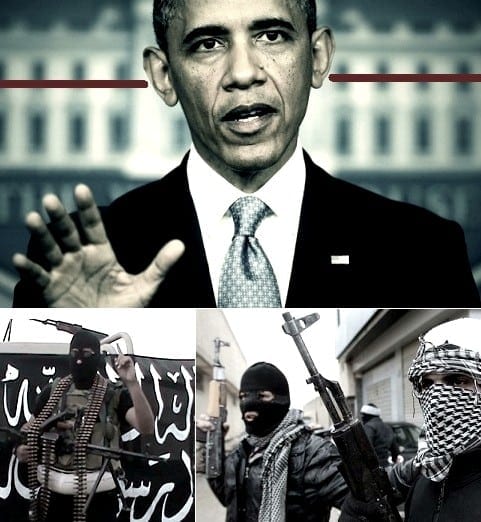
Stealthy, hypocritical mass murderers like Bush, Obama and the rest operate behind a thick curtain of bald-faced lies, glaring omissions, and public relationese.
[dropcap]S[/dropcap]yria, the scene of the present global attention, ironically just so happens to be the first battleground of the New Cold War, and it makes for a certain sense of poetic justice that the most epic geopolitical resistance that the US has ever experienced is taking place right there. The Pentagon’s power ploy in wrestling full control of the region by means of the “Arab Spring” Color Revolutions was the opening salvo of the New Cold War, as the US had originally planned to carry the chaotic regime change momentum all the way to Central Asia and thenceforth to the Resistant & Defiant (R&D) states of Russia, China, and Iran. It goes without saying that all three of these actors understood the global power grab that the US was undertaking even if they were slow in coordinating their response, and had it not been for fierce and patriotic Syrian resistance to this scheme, it’s possible that they would have been in a much less advantageous and more disorganized position in confronting it today.
Syria’s sacrifices stopped the tidal wave of terror from slamming into the R&D states, and Russia’s gratitude was expressed through its 2013 diplomatic intervention in staving off an American bombing campaign against the country. This bought the R&D states a bit more time to prepare before the next imminent onslaught, but it unwittingly provoked the US into moving forward its regime change plans for Ukraine and deploying them a year ahead of schedule. This vengeful attempt was meant to ‘punish’ Russia for the global embarrassment that it inflicted on the US in Syria, and it’s what most people mistakenly think set off the New Cold War, overlooking that it was Syria, not Ukraine, where the first battle was fought. Incidentally, everything has come full circle, and the most important stage of the New Cold War is presently being played out in Syria, as the COR smashes the terroristic instruments of unipolar hegemony and midwifes the birth of the multipolar world order, and more than likely, it won’t limit its successes to the Mideast either.
Chasing Evil
[dropcap]T[/dropcap]he largest uncertainty facing American strategists is exactly how far the COR will geographically go in fighting back against global terrorism. The present focus is obviously on the Syrian-Iraqi theater, but after the conclusion of that campaign, one must realistically ponder whether the Allies could repeat their success in Libya or Afghanistan, pending of course an official request from those countries’ leaders. Of corroborating note, it’s hugely significant that shortly after the COR’s anti-terrorist intervention in Syria, Kerry urgently pleaded with Libya’s leaders (both de-jure and de-facto) to form a government as soon as possible so as to stop ISIL from taking further hold of the country. One could venture to guess that the US is seriously worried about the possibility that an expanded COR, this time including Egypt (which has selectively intervened in Libya in the past), could intervene in the failed state in order to root out the Pentagon’s proxy forces and save the country from following The New York Times’ “Blood Borders”-like scenario of trilateral state fragmentation.
Concerning Afghanistan, if ISIL ever manages to establish a destabilizing enough foothold there, it’s possible that Kabul, having been witness to the efficiency of the COR’s anti-terrorist airstrikes in Syria, could request similar assistance in dislodging the terrorist group. If that happened, then it would be the final nail in the US’ Central-South Asian coffin of chaos, as Afghanistan would thus be signaling the beginning of its own War of Independence in removing the US’ presence. With the proxies go the patron, so it’s expected that as soon as the terrorists are extinguished from Libya and Afghanistan (potentially with COR assistance), the US will also be shown the door as well and these two states can finally regain the sovereignty that they had earlier lost.
Additionally, as a tangent of the Afghan scenario, if some type of terrorist threat emanating from the country was directed towards Central Asia (most realistically Tajikistan), it’s unquestionable that Russian-led COR-CSTO airstrikes will immediately be used to stop it. Likewise, Uzbekistan might even entertain the possibility of requesting multilateral Russian-involved assistance if a similar incident happens along its borders and spirals out of control, but only, of course, in very specific circumstances and if absolutely necessary for its survival. The problem in this operational Central-South Asian theater, however, is if a multitude of threats emerges simultaneously, which in that case could prove overwhelming for Russia’s military-strategic planners and will be addressed in Part IV of the article.
Crushing The US’ Pillars Of Power
Not counting Israel (which is in a special category of its own), US influence over the Mideast had rested on two primary pillars of power, Turkey and Saudi Arabia, but this construction is now crumbling as Russia returns to the region. In a twist of geopolitical fate, what the US had previously assumed to be the most stable countries in the region are now the two on the greatest verge of destabilization, and ironically, the two which the US had tried the most to destabilize (Syria and Iraq) are now the ones which look to have one of the most stable futures. Addressing the former, Erdogan’s bumbling miscalculations have returned Turkey to a state of de-facto civil war, while Saudi Arabia’s disastrous War on Yemen has given rise to a ‘rogue royal’s’ plan for regime change (to say nothing about the separate threats of ISIL and an Eastern Province revolt).
Looking at Syria and Iraq, one of the COR’s geopolitical intentions is to safeguard the sovereignty and territorial integrity of its members, and the elimination of ISIL goes a far way in accomplishing that goal. Furthermore, concerning the previous fears of Kurdish separatism, it’s safe to say that Russia’s military assistance to the group has quelled this sentiment and endeared Moscow with a certain degree of influence in Erbil, which could of course be used to temper any secessionist thoughts that would play out to the US’ strategic advantage. With the Kurdish issue being dealt with, and the Wahhabist terrorists on the run, Syria and Iraq have a lot more to look forward to in their futures than civil war-struck Turkey and (royally and domestically) divided Saudi Arabia do, and this has of course weakened American grand strategy in the Mideast unlike any other series of events that has come before it and will be fleshed out more in Part II.
The Defeat Of The Reverse Brzezinski
[dropcap]T[/dropcap]he COR’s carefully delegated application of force in Syria – Russian support remains limited to air missions, the Syrian Arab Army and Kurdish militias take care of the full ground component – presents a disciplined way to prevent the temptation of mission creep, the core of the Reverse Brzezinski. If Russia and Iran can avoid this strategic pitfall, then they’d have nullified one of the US’ most innovative policies and won themselves much-needed breathing room for addressing future regional security threats. The more one reflects upon it, the more it becomes clear that the key to beating the Reverse Brzezinski is to assemble the proper coalition of forces for intervening in the “quagmire” zone. If either Great Power attempted to do so on its own and without self-restraint, then its chances of falling for the dupe would have greatly increased, but in the current case of Syria (and soon to be, Iraq), they’ve proven themselves more than able to patiently and multilaterally address the situation and steer clear of the US’ trap. If they can maintain this state of mind and inclusive operational behavior going forward (and there’s no reason to think that they can’t), as well as carry these lessons over to any forthcoming Reverse Brzezinski scenarios such as the South Caucasus or Central Asia, then the US’ formerly flexible strategy of entrapment would become a lot more rigid and much less likely to be employed in the future.
Note to Commenters
Due to severe hacking attacks in the recent past that brought our site down for up to 11 days with considerable loss of circulation, we exercise extreme caution in the comments we publish, as the comment box has been one of the main arteries to inject malicious code. Because of that comments may not appear immediately, but rest assured that if you are a legitimate commenter your opinion will be published within 24 hours. If your comment fails to appear, and you wish to reach us directly, send us a mail at: editor@greanvillepost.com
We apologize for this inconvenience.
![]() Nauseated by the
Nauseated by the
vile corporate media?
Had enough of their lies, escapism,
omissions and relentless manipulation?
Send a donation to
The Greanville Post–or
But be sure to support YOUR media.
If you don’t, who will?
The Stooge and the Statesman
![]()
//
If your bubble has burst, you can hardly listen to him through to the end. And if you somehow succeed you will develop an increased awareness of his deception. And of your own disgust.
Over 4,700 words that perfectly fit the narrative that the mainstream media daily foist off on the public. Indeed MSM has failed us all countless times, and though deception was revealed, no retraction followed. Yet this man persists. Dour mug, focused eye, a measured declaring, as of one who bears upon his shoulders fathomless commitments – we had gotten used to it. Patently, there’s an impressive number of people who actually believe he does.
If the U.S. weren’t sick with Corporatism, this man wouldn’t be on that podium lying to us all. Advanced symptoms of the disease are apparent, as corporations dominate nearly every aspect of society, and government serves them as a tool to consolidate their power ever further. A Corporate State has a Corporate Government, which enacts Corporate Laws, pushes for a Corporate Economy, and then provides Corporate Jobs (aka McJobs), Corporate Education, and Corporate Healthcare to a Corporate Citizenry. A Corporate State is a Corporation-ruled state.
…
In a Corporate State no one but a stooge will stand as President. No matter whether in charge is a bubba from Arkansas, a sham cowboy, a sissy black, or a warmongering harebrained bitch: a stooge bears no responsibility. However indecent or heinous he might be, as long as he’s doing his Corporate Bidding, he’ll brazenly beat the rap. The rise of dissenting voices will remain offstage; unheard, ineffective. A Corporate State holds power over the citizens through the Corporate Media apparatus, which spreads scourge by shaping opinion.
Mesmerized by News channels and distracted by status quo-supporting Hollywood paradigm, Corporate Citizenry firmly believes itself to be free and safe, while shamelessly parroting events and statements it was indoctrinated to, proudly saluting its flag, listening to and thanking the Stooge-in-Chief.
…
At the UN General Assembly on September 28, U.S. President Barack Obama praised the founding, 70 years ago, of the institution and its achievements, acknowledging unparalleled advances in human liberty and prosperity, diplomatic cooperation, a buttress to global economy, and the lift of a billion people from poverty. Despite many notches scored by the UN, his administration bypassed it entirely when it was time to invade Libya, and is currently doing the same in Syria, where it is bombing with no UN Security Council mandate or invitation by the duly-elected government.
In his speech, Obama called Syrian President Bashar al-Assad a tyrant who dropped barrel bombs on children, but the attacks in East Ghouta on August 2013 shortly afterwards turned out to be a false flag operation, with no shred of evidence against Syrian government forces. Indeed, it was to serve as pretext for another U.S. humanitarian invasion, but Russian warships were promptly deployed off the Syrian coast. Obama said that a terrorist group beheads captives, slaughters the innocent, and enslaves women. Those are the moderate rebels that his administration funded, the CIA trained, and its counterparts in the Mideast facilitated the rise, in order to create a strategic asset to use for regime change in Syria. Assad is fighting against them.
[dropcap]O[/dropcap]bama purported to remind us how the Syrian mess began: “Assad reacted to peaceful protests by escalating repression and killing that, in turn, created the environment for the current strife.” Before 2011, Syria was the only country in the Mideast with no domestic conflicts. Assad had, and still has, the support of the overwhelming majority of the population. The Syrian fake revolution began with attacks during pro-government rallies perpetrated by armed groups against demonstrators and police – the same plot as in Libya and Ukraine. Operations were masterminded by Western Intelligence services and triggered a civil war waged by the U.S., Saudi Arabia, Qatar, Turkey, and Israel. The truth is Syria is the only Mediterranean country with a state oil company and the only Arab country not indebted to IMF. Here’s what created the environment for a strife.
…
[dropcap]A[/dropcap] truly frightening thing Obama said was, “We know that ISIL depends on perpetual war to survive.” Truly scary for those whose bubble has burst indeed, since they know that after WW2 in the U.S. even Defense Industry merged with Corporatism – a Corporate Defense to profit from war.
…
Likewise he referred to Gaddafi, without naming him, as a tyrant. Gaddafi’s 40-year long rule turned Libya into the richest African country, which provided its citizens free healthcare, free education including University, free electricity, no interest loans, exceptional welfare state, and much more. In addition to this, Gaddafi was engaged in a project of de-dollarization in African natural resources trade, and the creation of an African bank system to free the continent from the clutches of Western corporations. A good reason to make a tyrant out of him.
…
Amazingly, Obama claimed the military intervention prevented a slaughter. Actually, it’s estimated that 30,000 Libyans were killed by NATO and its rebels.
[dropcap]T[/dropcap]hen he recalled Russia’s annexation of Crimea, pointing out Russian aggression in eastern Ukraine. Even Commander-in-Chief of the Armed Forces of Ukraine General Viktor Muzhenko stated they have no evidence of Russian troops on Ukrainian soil. French Intelligence and the OSCE observers claimed the same. German Authorities revealed that the ‘Russian invasion’ issue was an invention of U.S. mainstream media. Yet still some idiots yack about it – the Stooge-in-Chief along with them. Why does a referendum stir up plenty of bile to Obama? Were the Crimeans to use firebombs and batons, like the neo-Nazis in Kiev, to please him?
…
He went on to state that the U.S. has few economic interests in Ukraine. Possibly it’s unknown to him that Hunter Biden, the cocaine addict son of U.S. VP Joe Biden, is on the board of directors of a company engaged in partnership with Shell in fracking (Hydraulic Fracturing) in East Ukraine, aka Donbass? A 50-year production sharing deal between Shell and Ukraine was signed on January 2013. It’s worth $10 billion and is the largest foreign direct investment ever for Ukraine. Then, why did Senator Insane McCain and other U.S. and EU officials cheer up anti-government protesters in Kiev? By the way, none of them appealed to the mob to eschew violence. And why did Deputy Secretary of State V. Nuland discuss with U.S. Ambassador G. Pyatt who should or shouldn’t be in the next Ukrainian government? And most of all, why did puppet-president Poroshenko – a CIA insider in Ukraine since 2006 – sign the law on Ukraine’s abandonment of its non-aligned policy?
…
The Stooge said, “Imagine if Russia had engaged in true diplomacy.” Let’s say, ‘Imagine if Russia had deployed some hundreds bases in Mexico, Canada, and all over the Caribbean.’
…
He praised the Trans-Pacific Partnership, an agreement that will open markets, while protecting the rights of workers. Of course, a deal comparable to a gift to workers is way better to be negotiated in secrecy.
…
He blathered on about a nation of immigrants, international law, Ebola, future generations, free media. Free media in a country where six corporations control 90% of the media – is a Corporate State! His administration has been brutal in targeting whistleblowers, guilty of leaking real information to the press. A Pentagon document, the Law of War Manual, states that journalists may be treated like ‘unprivileged belligerents’, and allows the military to detain and question them. World Press Freedom Index ranked the U.S. at 49th place, lower than several African and South American countries. Obama said, “You can jail your opponents, but you can’t imprison ideas.” He should have said, “I can detain indefinitely without trial, as well as torture, and kill whomever I please within the U.S. and abroad.”
…
And again, “You can try to control access to information, but you cannot turn a lie into truth.” Meanwhile his administration paid for CNN content to run propaganda. Trumped-up stories were to look like news and adverse ones were to be deleted – it was the Amber Lyon Show!
…
He mentioned social media, but not to say that Facebook and Google, along with U.S. spy agencies, are part of Big Brother, which intercepts all data communication of Americans and the colonized Europeans – including Merkel and Hollande.
…
Then, he rejected the wall to keep out migrants in Hungary – but the one built by Israelis is cool, right? According to him, for 50 years the U.S. pursued a Cuba policy that failed to improve the lives of the Cubans. Improving lives by imposing an embargo, I wonder? What an idea! Let’s say the U.S. are increasingly isolated in Latin America, losing ground in favor of Russia, and this compelled him to end hostile policies. And again he said, “We can be patriotic without demonizing someone else.” So, were those compliments, when addressing Assad, Putin, Gaddafi? Lately, wasn’t he saying even Venezuela has turned into a threat to American security? Wasn’t a Chinese aggression undergoing in the South China Sea? After having violated the Constitution in any possible way, he dared to cite George Washington! And more minor gibberish, unsubstantiated claims likely ridiculous even to the debt-bloated penpusher who wrote that filth on his behalf.
…
Obama’s speech included just a couple of sentences not to be labeled as pitiful lies. It was about Iran: “The Iranian people have a proud history, and are filled with extraordinary potential. But chantingDeath to America does not create jobs, or make Iran more secure.”
…
True. Neither do sanctions create jobs. Nor does surrounding Iran with U.S. military bases make it secure. By the way, how many jobs were created by chanting Death to Gaddafi? And has that made Libya more secure? Iran has never owned nukes. Sanctions were imposed against them to harm a competitor rich in resources and noncompliant with a U.S.-vetted government in office, and they were lifted because circumstances were changing to its benefit: with or without their removal, Russia, China, and even the EU were to re-engage Iran.
…
Drawing to a close, Obama found a way to insert a veiled threat: “Catastrophes, like what we are seeing in Syria, do not take place in countries where there is genuine democracy and respect for the universal values this institution is supposed to defend.”
…
It means any country whose government from the Western point of view is not deemed democratic, aka neoliberal/pro-U.S., runs the risk of facing violent uprisings and a raise of terrorist formations aiming at overthrowing the government in office. It’s the export of colored revolutions, a destabilize/invade/plunder program sponsored by the U.S. State Department.
…
By the end of a self-complacent, damning, lengthy performance, the message handed over was: all in all, the Good Guys have done a good job, and American exceptionalism is here to stay.
…
‘We can no longer tolerate the current state of affairs in the world.’
…
About half an hour had passed when these words bashed that very audience in a fraught silence. Russian President Vladimir Putin put matters straight in 23 minutes and nailed whomever it may concern to their responsibilities without having to mention them once.
…
Policies perpetrated by a sole center of dominance, based on conviction in its exceptionalism and impunity, may lead to the collapse of international relations, and give rise to a world ruled by selfishness rather than collective effort, by dictate rather than equality and liberty, with protectorates controlled from outside rather than independent states.
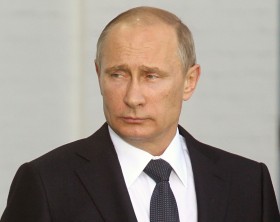
Putin finally got tired of seeking an amicable accommodation with the imperialist West. He has begun to remember that the best defense —and the ONLY thing that unregenerate bullies respect, is offense. China is reaching the same conclusion.
…
No nation should be forced to conform to a single development model that somebody has declared the right one. Still, some prefer to export so-called “democratic” revolutions. In the Mideast and North Africa, the unleashed violence has destroyed government institutions and local lifestyle, bringing about poverty, social disaster, and total disregard for human rights, including the right to life.
…
‘I’m urged to ask those who created this situation: do you at least realize now what you’ve done?’
…
Vacuums of power resulted in the emergence of areas of anarchy, quickly filled with extremists and terrorists. Members of the so-called ‘moderate’ Syrian opposition get arms and training by the West, then defect to the Islamic State, which does not come from nowhere, for it was initially developed as a weapon against undesirable secular regimes. It’s hypocritical and irresponsible to warn against the threat of terrorism and then turn a blind eye to its funding channels.
…
Stop playing games with terrorists to achieve political goals. Create a broad anti-terrorism coalition based on UN Charter. Fix the Mideast to fix the refugee crisis. Restore statehood in Libya, strengthen government institutions in Iraq, provide comprehensive assistance to the legitimate government of Syria – President Assad’s troops along with Kurdish militia are the only forces truly fighting terrorists in Syria. Any assistance to sovereign nations is to be offered rather than imposed, in strict compliance with the UN Charter.
…
It’s been NATO expansionism to Post-Soviet countries to spark off a major geo-political crisis in Ukraine. Sole way out of the dead end is full implementation of the Minsk agreement. No integrity can be ensured by threats or military force, and the rights and choices of Donbass citizens must be respected. Unilaterally imposed sanctions circumventing the UN Charter serve political objectives and aim to eliminate market competition.
…
Trade rules are to be discussed within the framework of the United Nations, the WTO, and the G20, not rewritten behind closed doors to accommodate the interests of a privileged few.
…
Once the speech was over, it was clear who was in charge.
…
While Obama delivered the crude, deceptive propaganda to the assembly, Putin presented a stark foreign policy agenda, and eventually stood up as the man to take over and put an end to chaos. Putin has faced terrorism all his political career long. He fixed Dagestan. He fixed Chechnya. He fixed South-Ossetia. He’s got skills to fix Syria and Iraq as well.
…
When he rose to power, Russia was falling apart after the disastrous policies of the soaked-puppet Yeltsin, with no real budget, rampant inflation, low foreign exchange reserve, high crime rate and unemployment, public asset looted by foreign companies and crook oligarchs, and deeply indebted. Fifteen years after, Putin has re-built the country into a superpower reasserting its stance on the global political chessboard, leading major trade partnerships and an impressive military. This makes him a Statesman.
* Published by The Voice of Idaho on 7th of October 2015
Note to Commenters
Due to severe hacking attacks in the recent past that brought our site down for up to 11 days with considerable loss of circulation, we exercise extreme caution in the comments we publish, as the comment box has been one of the main arteries to inject malicious code. Because of that comments may not appear immediately, but rest assured that if you are a legitimate commenter your opinion will be published within 24 hours. If your comment fails to appear, and you wish to reach us directly, send us a mail at: editor@greanvillepost.com
We apologize for this inconvenience.
![]() Nauseated by the
Nauseated by the
vile corporate media?
Had enough of their lies, escapism,
omissions and relentless manipulation?
Send a donation to
The Greanville Post–or
But be sure to support YOUR media.
If you don’t, who will?








